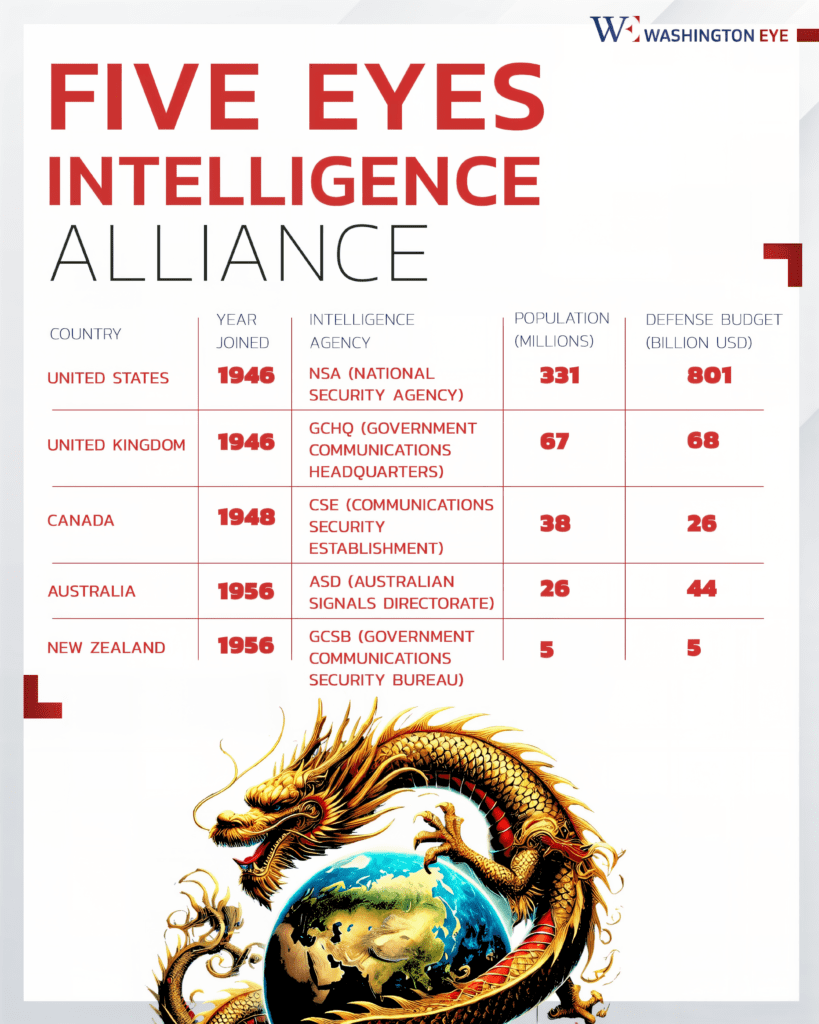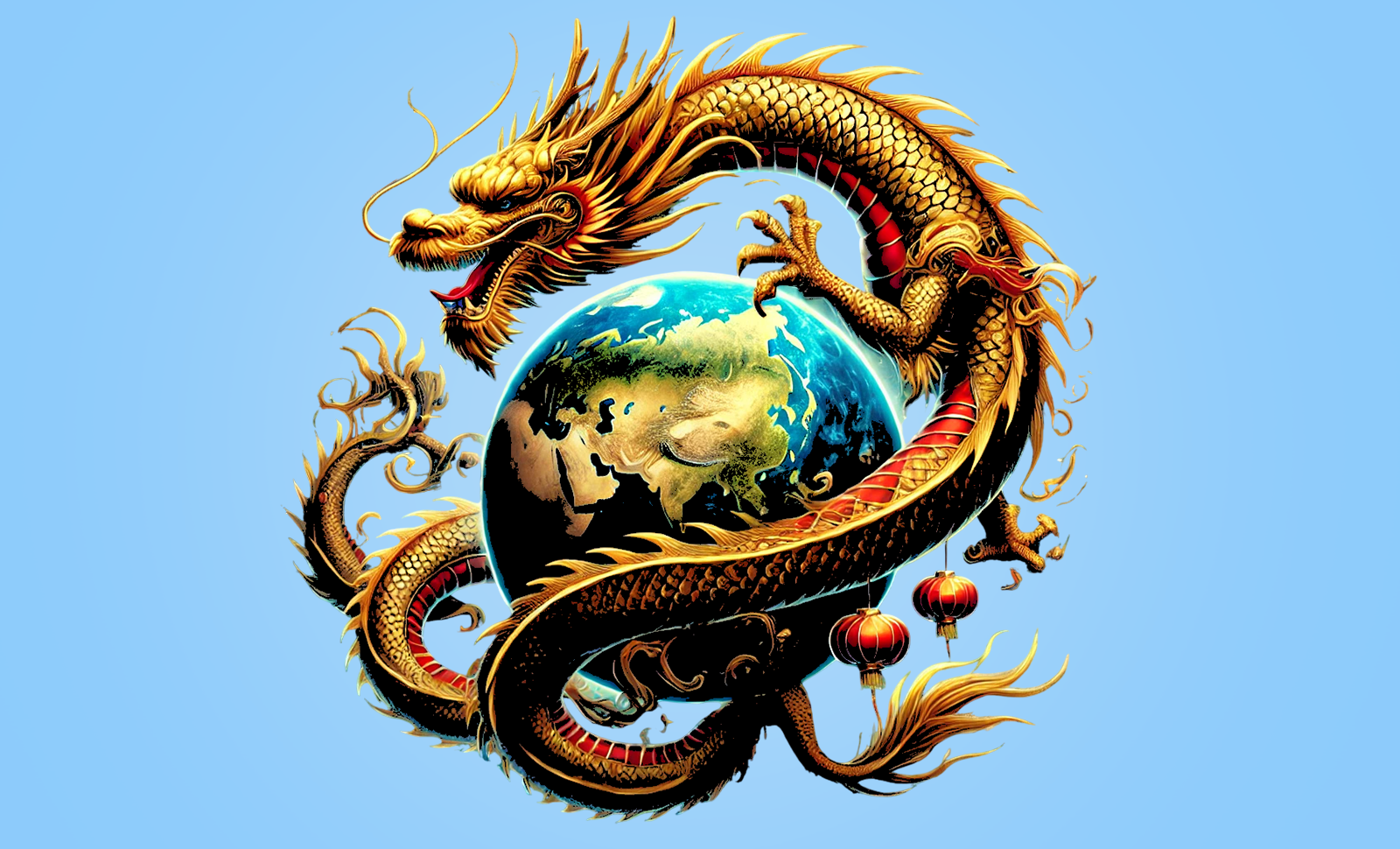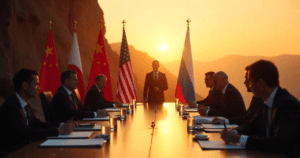In the shifting geopolitical landscape of the Pacific, intelligence agencies within the Five Eyes alliance are raising alarms over China’s expanding influence. As Beijing strengthens its economic and strategic footprint in the region, concerns about espionage, security vulnerabilities, and the unity of the Five Eyes have intensified. Against this backdrop, New Zealand—a historically cautious participant in Western intelligence-sharing—finds itself at the heart of a debate over security priorities, national sovereignty, and economic pragmatism.
What is the Five Eyes?
The Five Eyes is one of the world’s most exclusive intelligence-sharing alliances, comprising the United States, the United Kingdom, Canada, Australia, and New Zealand. Established in the aftermath of World War II, it emerged from a secret agreement—formally known as the UKUSA Agreement—signed in 1946 to enhance signals intelligence cooperation. Over the decades, the alliance has expanded its scope to counter terrorism, cyber threats, and geopolitical challenges. Five Eyes members regularly exchange intelligence on state and non-state actors, with each country contributing insights from its own strategic domain.
However, recent developments—ranging from China’s increasing presence in the Pacific to the changing dynamics of U.S. foreign policy—have raised questions about the alliance’s unity and direction.
China’s Influence in the Pacific and New Zealand’s Crossroads
New Zealand’s top intelligence official, Andrew Hampton, recently warned that China’s activities in the Pacific extend beyond mere economic partnerships. According to Hampton, Beijing’s growing presence in the region is accompanied by intelligence-gathering efforts and strategic influence campaigns designed to reshape regional alliances in its favor. His comments come as New Zealand reassesses its role within Five Eyes, facing pressure from allies to adopt a tougher stance against China while maintaining crucial economic ties with Beijing.
For years, Wellington has walked a delicate tightrope, balancing its intelligence obligations with the economic reality that China is one of its largest trading partners. However, as tensions rise, this balancing act is becoming increasingly difficult. Should New Zealand deepen its commitment to Five Eyes, potentially jeopardizing relations with China? Or should it maintain a neutral stance, risking the perception of being the alliance’s weakest link?
Real-World Examples of Five Eyes Intelligence Sharing
The Five Eyes alliance has played a crucial role in several high-profile intelligence-sharing operations. One notable example is Operation Cloud Hopper (2018), in which Five Eyes members uncovered a large-scale cyber espionage campaign linked to the Chinese state-sponsored hacking group APT10. The attack targeted managed IT service providers, compromising businesses and government agencies across multiple countries. Intelligence gathered by the UK’s GCHQ and the US’s NSA was shared with Australia, Canada, and New Zealand, enabling countermeasures to be deployed swiftly and limiting the attack’s impact.
Another example is the 2021 Microsoft Exchange Hack, where Five Eyes nations worked together to attribute the attack to Chinese state-backed hackers. This breach targeted vulnerabilities in Microsoft Exchange servers, affecting thousands of organizations worldwide. A coordinated response from Five Eyes nations led to public attribution and cybersecurity defenses being reinforced against similar threats.
These cases highlight the effectiveness of real-time intelligence sharing among Five Eyes members. However, with political shifts in Washington and growing internal disputes, some members fear that the alliance’s effectiveness could be at risk.
Growing Divisions: Is Five Eyes at a Crossroads?
Despite its long history of cooperation, the Five Eyes alliance is facing internal strains. Reports suggest that some members are considering limiting intelligence shared with the United States over concerns about Washington’s evolving stance on Russia. Historically, Five Eyes has maintained a consistent approach toward Russia, treating it as a geopolitical rival. But with the U.S. engaging in more direct dialogue with Moscow, questions have emerged about how intelligence gathered by the alliance might be used—or withheld.
Furthermore, a top adviser to former U.S. President Donald Trump has suggested that Canada should be removed from Five Eyes altogether. This radical proposition stems from Trump’s past criticisms of Canada’s defense spending and intelligence contributions. If such a move were to materialize, it would mark the most significant fracture in the alliance’s history.
The Role of AUKUS in Intelligence and Military Strategy
As tensions within Five Eyes grow, another security pact is rising in prominence: AUKUS. Signed in 2021, AUKUS is a trilateral defense agreement between the United States, the United Kingdom, and Australia, primarily aimed at countering China’s military expansion in the Indo-Pacific. The pact focuses on technological cooperation, including the provision of nuclear-powered submarines to Australia and joint developments in cyber warfare, artificial intelligence, and hypersonic weapons.
Unlike Five Eyes, which centers on intelligence-sharing, AUKUS is more focused on military capabilities. However, the increasing alignment of AUKUS members on security matters could mean that it starts to function as an alternative intelligence-sharing network, particularly if fractures emerge within Five Eyes. Could AUKUS eventually overshadow Five Eyes as the primary Western security alliance in the Pacific?
New Zealand’s Security Dilemma
For New Zealand, these developments present a diplomatic and security conundrum. While its membership in Five Eyes is longstanding, Wellington has so far chosen to stay out of AUKUS, citing its nuclear-free policy as a key reason. However, with China’s expanding influence and Five Eyes itself under strain, New Zealand may have to reconsider its position.
Could Wellington eventually be pressured into joining AUKUS in some form, even if only in intelligence-sharing rather than military cooperation? And if the Five Eyes alliance weakens, what would that mean for New Zealand’s security?
The Future of Five Eyes in a Changing World
China’s strategic push into the Pacific has placed Five Eyes under immense pressure, revealing internal divisions and raising questions about the alliance’s long-term viability. New Zealand’s balancing act between economic interests and security commitments is becoming increasingly precarious, while Five Eyes itself faces potential fragmentation due to political shifts in the U.S. and disagreements over intelligence-sharing.
With AUKUS emerging as a parallel security initiative and debates over Russia further straining U.S. relationships within the alliance, Five Eyes is at a crossroads. Will it adapt and remain a cornerstone of Western intelligence cooperation, or will internal disputes and external pressures lead to a fundamental reshaping of how intelligence is shared in the Pacific and beyond?

















